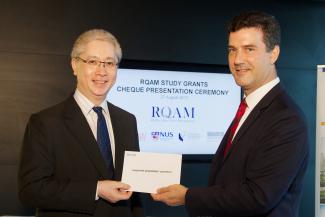
A new analysis of Hong Kong and Singapore firms finds links between the incidence of corporate fraud and characteristics of boards of directors.
By Jeremy Chan
SMU Office of Research & Tech Transfer – Companies that have committed fraud are more likely to have board structures that potentially reduce their effectiveness at providing checks and balances, according to new research published in the Hong Kong Law Journal.
Led by Associate Professors Wan Wai Yee and Christopher Chen at the Singapore Management University School of Law, the study focused on listed companies in Hong Kong and Singapore, examining links between the incidence of corporate fraud and various characteristics of the companies’ boards of directors. The research was supported by an Academic Research Fund Tier 2 grant from the Singapore Ministry of Education, and also involved Professor Say H Goo of the University of Hong Kong and Assistant Professor Xia Chongwu of Xiamen University.
After the 1997 Asian financial crisis, Hong Kong and Singapore instituted corporate governance reforms requiring a larger proportion of a company’s board to consist of independent directors. However, even with such regulations in place, a slew of corporate fraud cases occurred in both jurisdictions in the wake of the 2007/2008 financial crisis, suggesting that independent representation on boards may not suffice in curtailing fraudulent activity.
In the present study, the researchers collected data on the composition of board members of 37 Hong Kong firms and 25 Singapore firms which were investigated for corporate fraud between 2007 and 2014. They compared these ‘fraud firms’ against a control group of 62 similar but fraud-free companies.
“We found that fraud firms show a higher propensity to have the chairman and CEO being the same person or immediate family members. This lessens the degree of checks and balances in board meetings, and could reduce the effectiveness of an independent board,” says Professor Chen. Indeed, nearly half the fraud cases in the sample involved problematic related party transactions, where outright misappropriation of assets, suspicious approval, or non-disclosure of payments or benefits were found to have occurred.
Fraud firms also had a lower proportion of audit committee members with non-accounting financial expertise than fraud-free firms, suggesting that the boards of fraud firms may be less adept at reviewing accounts or suspicious transactions, the researchers found.
A further finding of the study was that fraud firms are more likely to be overseas firms. “There remain difficulties in regulating foreign listings when most operations or assets are outside the listed market. The challenges may include enforcing rules against errant directors and controlling shareholders in another country. These difficulties may not be resolved simply by adding more independent directors or experts to the board,” Professor Chen explains.
As an alternative, separating the roles of chairman and CEO could help strengthen corporate governance in publicly listed companies; regulators could also consider requiring firms to recruit more finance and accounting experts to their boards, recommended the researchers. Finally, mechanisms could also be put in place to allow directors to gain more access to information that would improve their ability to review suspicious dealings.
“We will continue to monitor the change of regulatory regimes in Hong Kong and Singapore markets and periodically update our data; we may thus revisit our arguments in the future. In addition, to deepen our research, we may spin off or expand the study to other areas such as disclosure and director’s networks,” says Professor Wan.
This article is a summary piece of the following paper:
Wan, Wai Yee, Chen, Christopher, Xia, Chongwu, and Goo Say H. (2018). “Managing the Risk of Corporate Fraud: The Evidence from Hong Kong and Singapore.” Hong Kong Law Journal 48(1): 125-166 (*SSCI; Scopus)
For more information, please contact:
Goh Lijie (Ms)
Office of Research & Tech Transfer
DID: 6828 9698
Email: ljgoh [at] smu.edu.sg (ljgoh[at]smu[dot]edu[dot]sg)
Back to Research@SMU Issue 59
Image credit: